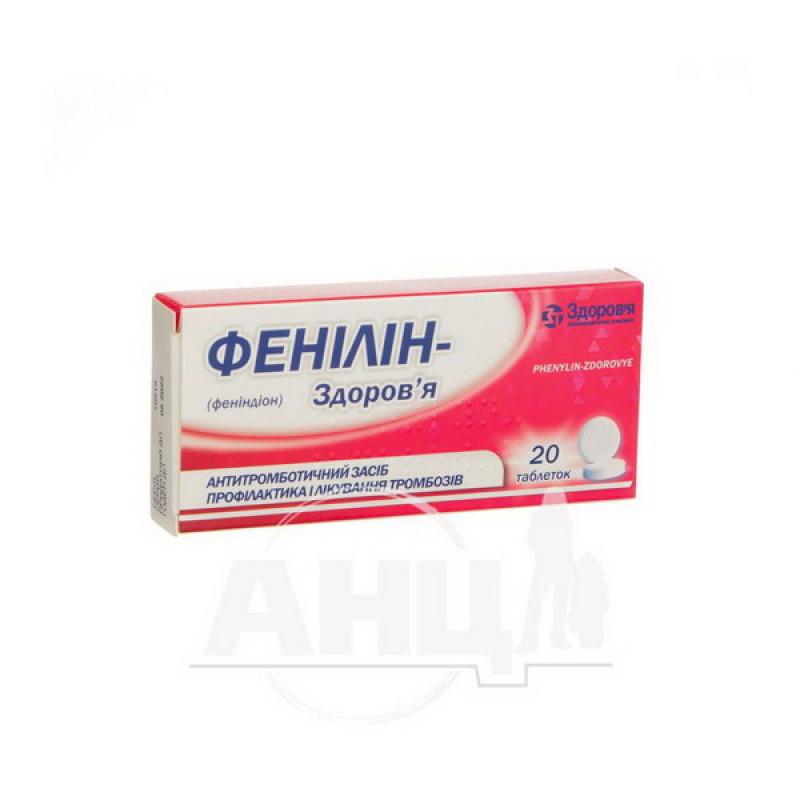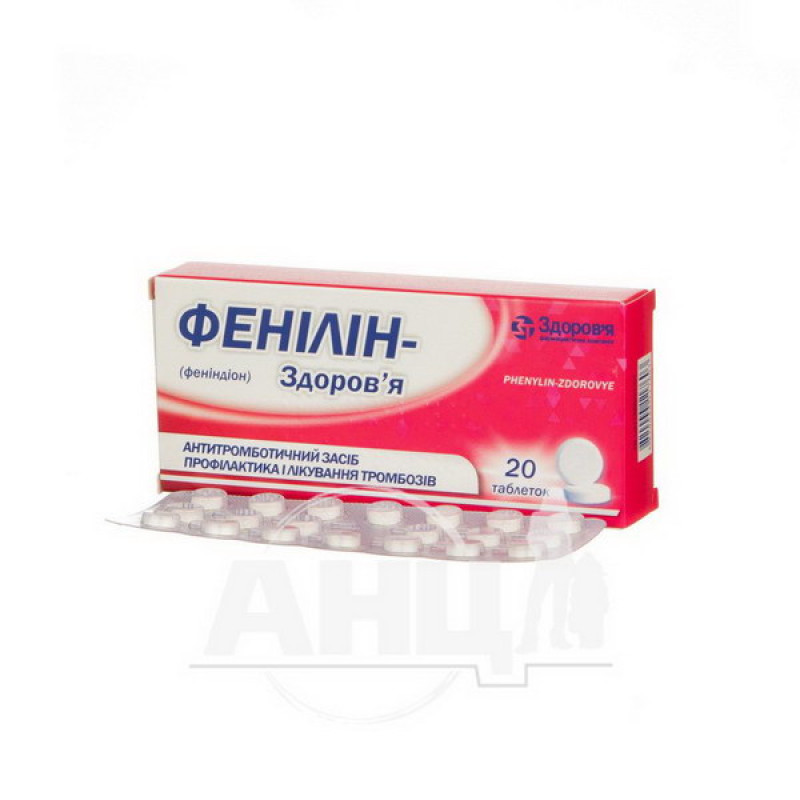Fenilin-Health tablets 30 mg blister No. 20

Fenilin-Zdorovya tablets are used for the following indications: prevention and treatment of thrombosis (especially deep veins of the lower extremities), thromboembolic complications (pulmonary embolism, strokes, myocardial infarction) and thrombus formation in the postoperative period in patients with mechanical heart valve prostheses.
Composition
The active substance is phenindione (one tablet contains phenylin (phenindione) 30 mg).
Excipients: lactose monohydrate; potato starch; talc; citric acid, monohydrate.
Contraindication
hypersensitivity to the components of the drug; hemophilia; threat of abortion; large postoperative wounds; bleeding from the digestive, respiratory, genitourinary systems; recent surgical interventions or injuries of the brain / spinal cord, eyes; recent lumbar anesthesia, liver or kidney biopsy; severe hepatic and / or renal failure; hemorrhagic diathesis; hypocoagulation (initial prothrombin level less than 70%); erosive-ulcerative lesions of the digestive tract; severe arterial hypertension; a condition in which therapy cannot be carried out safely enough (for example, psychosis, dementia, alcoholism).Method of application
Administer to adults and children over 14 years of age (with a body weight of at least 45 kg) orally after meals.
The dose is set by the doctor individually, taking into account sensitivity to the drug, the nature of the disease, nutritional characteristics and concomitant treatment.
Adults should be prescribed on the first day of treatment in a daily dose of 120-180 mg (4-6 tablets) in 3-4 doses, on the second day - in a daily dose of 90-150 mg (3-5 tablets), then - 30-60 mg (1-2 tablets) in 1-2 doses, depending on the level of prothrombin in the blood.
Children aged 14 and over (with a body weight of at least 45 kg) should be prescribed on the first and second days of treatment in a daily dose of 90-150 mg (3-5 tablets) in 3-4 doses, then 30-60 mg (1-2 tablets) in 1-2 doses, depending on the level of prothrombin in the blood.
The single dose, frequency and duration of use are set individually by the doctor depending on the value of the blood prothrombin index, which is maintained at 40-60%. If the prothrombin level is less than 40-50%, the drug should be immediately discontinued.
For the prevention of thromboembolic complications, prescribe 30 mg (one tablet) 1-2 times a day.
The highest doses for adults: single dose - 50 mg, daily dose - 200 mg.
The drug should be discontinued gradually.
Application features
Pregnant women
The drug is contraindicated during pregnancy (especially in the first trimester and in the second half of the third trimester). The drug should not be used in the first days after childbirth. If necessary, use of the drug should be discontinued during breastfeeding.
Children
The drug should be prescribed to children aged 14 years and older with a body weight of at least 45 kg.
Drivers
During the treatment period, you should refrain from driving vehicles and potentially dangerous activities that require increased concentration and speed of psychomotor reactions.
Overdose
Symptoms: hemorrhagic syndrome (gastrointestinal, uterine, nasal bleeding, hematuria, hemorrhages in the skin, muscles, parenchymal organs).
Treatment: drug withdrawal, oral administration of vitamin K (5-10 mg). In case of serious bleeding, vitamin K should be administered intravenously slowly (1 mg/minute) in a total dose of 10-50 mg (normalizes elevated prothrombin time within 6 hours). In case of massive bleeding or in patients with liver failure, fresh frozen plasma should be administered simultaneously. Aminocaproic acid, vitamins C and P may be used.
Side effects
From the side of the blood coagulation system: with prolonged use - micro- and macrohematuria, bleeding from the oral cavity and nasopharynx, gastrointestinal bleeding, hemorrhage into the muscles.
On the part of the blood: suppression of bone marrow hematopoiesis (agranulocytosis, leukopenia, leukemoid reactions).
On the part of the digestive system: nausea, vomiting, diarrhea, sore throat, taste disorders, stomatitis, toxic hepatitis, jaundice, ulcerative colitis, paralytic ileus with abdominal distension.
Cardiovascular system: myocarditis.
Allergic reactions: skin rashes (erythematous, macular, papular), exfoliative dermatitis, eosinophilia, hyperthermia, massive edema, skin necrosis.
From the urinary system: renal dysfunction, pink urine color, albuminuria.
Storage conditions
Store in the original packaging at a temperature not exceeding 25 °C, out of the reach of children.
Shelf life - 3 years.
There are no reviews for this product.
There are no reviews for this product, be the first to leave your review.
No questions about this product, be the first and ask your question.



